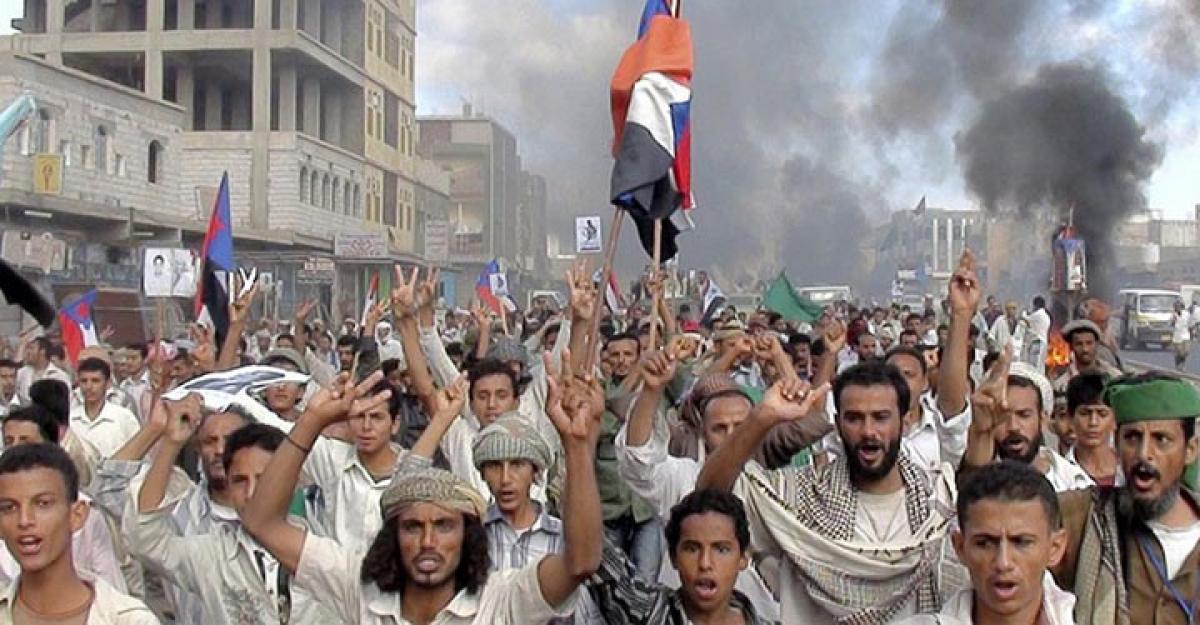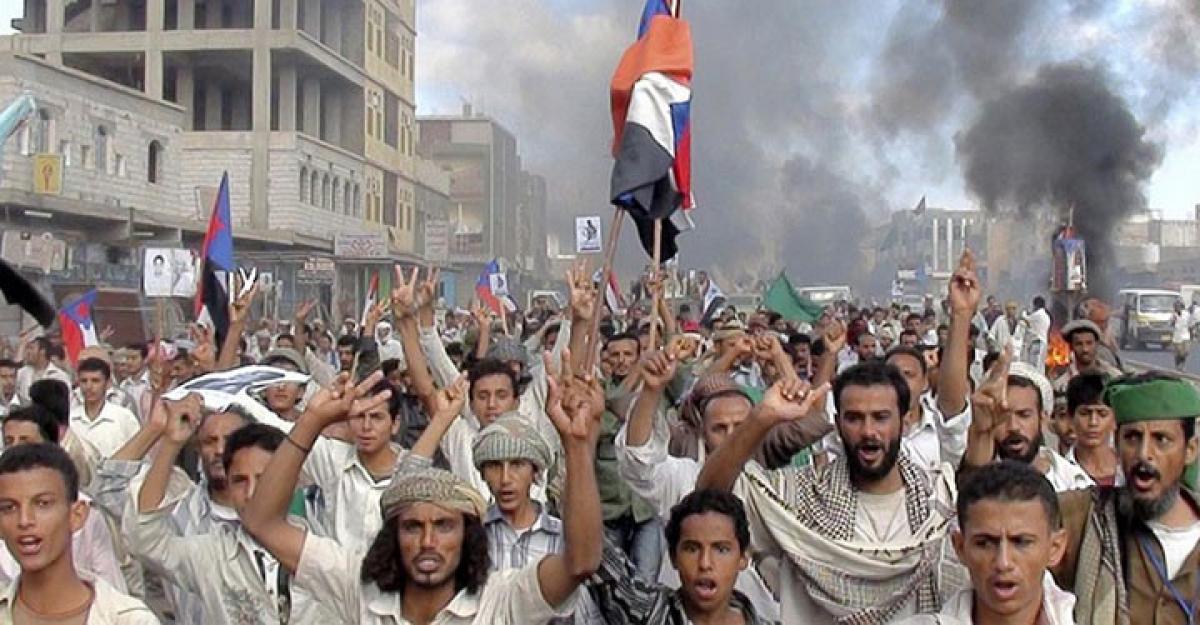Live
- NASA Tracks Five Giant Asteroids on Close Approach to Earth Today
- Pushpa 2 Hits ₹1000 Crore in 6 Days: How It Compares to Other Top Indian Films
- Vivo X200 and X200 Pro Launched in India: Price, Specifications, and Features
- Nitin Gadkari Admits Feeling Embarrassed at Global Summits Over Rising Road Accidents in India
- Comprehensive Review on Indiramma Housing Survey and Welfare Initiatives Conducted via Video Conference
- Jogulamba Temple Records Rs 1.06 Crore Hundi Revenue in 150 Days
- Opposition Slams ‘One Nation, One Election’ Bill as Anti-Democratic; BJP Allies Support the Move
- Celebrate Karthigai Maha Deepam Virtually with Sri Mandir’s LIVE Darshan Experience
- BJP Extends Support to Samagra Shiksha Abhiyan Employees' Strike, Demands Immediate Regularization and Welfare Benefits
- Dr. M. Priyanka Stresses Quality Education, Nutritious Meals, and Cleanliness in Schools
Just In

Yemen going to wrack & ruin. Mohsen Saleh al-Muradi does not just want to drive the Shi\'ite Houthi fighters out of Yemen\'s capital 130 km (80 miles) from his home town, he wants to hunt them down and stamp them out. \"I want to trample them under my feet.\"
Yemen has become the latest theatre in a wider regional rivalry between Sunni Saudi Arabia and Shi'ite Iran, whose proxies and allies have killed hundreds of thousands of people in civil wars inIraq and Syria
Marib : Mohsen Saleh al-Muradi does not just want to drive the Shi'ite Houthi fighters out of Yemen's capital 130 km (80 miles) from his home town, he wants to hunt them down and stamp them out. "I want to trample them under my feet."
 In a messy conflict of many fronts, the forces backed by wealthy neighbouring Gulf states against the Houthi fighters that control Sanaa often have little in common with each other and scant enthusiasm for the leader on whose behalf they are ostensibly fighting: President Abd Rabbu Mansour al-Hadi.
In a messy conflict of many fronts, the forces backed by wealthy neighbouring Gulf states against the Houthi fighters that control Sanaa often have little in common with each other and scant enthusiasm for the leader on whose behalf they are ostensibly fighting: President Abd Rabbu Mansour al-Hadi.
What they increasingly share is a visceral sectarian hatred for Shi'ites, a dangerous new trait in a country where different interpretations of Islam co-existed for centuries. The Houthis fought for two decades on behalf of the Zaydi Shi'ite sect which ruled a kingdom innorth Yemen for 1,000 years until it was toppled in a military coup in 1962.
Since last year Houthi fighters emerged as the most powerful force in the country, after forming an alliance with their former nemesis, ex-President Ali Abdullah Saleh, himself born a Zaydi but long a leader of the republican political establishment opposed to the old monarchy.
In Marib's market, the different backgrounds of the hundreds of armed men who said they had come there to fight against the Houthis show the complexities of a war in which Yemen's old tribal hierarchy and its sectarian harmony have eroded.
What united them was vehement anger at Saleh, the Houthis and their presumed Shi'ite ally Iran. The Houthis, for their part, typically accuse all their Sunni foes of supporting Islamic State.
"The Houthis weren't here before. But they want the whole country. The problem is their religion. It comes from Iran," said Ahmed, a soldier from the Red Sea, mostly Sunni, city of Hodeida. He was wearing a uniform provided by the Saudi-led coalition of Arab countries, who joined the war in March and have helped drive the Houthis from Aden in the south.
A percussive boom rolls over Marib from rugged mountains to the west, in what is likely to be the next pivotal battlefield as the anti-Houthi fighters try to close in on Sanaa. They are now fighting in the Sirwah region, but may soon move north through al-Jawf, the fighter said.
The war will dictate who rules Yemen, whether it remains a single country and the prospects of ending a human crisis affecting millions in one of the poorest Arab States. It has also become the latest theatre in a wider regional rivalry between Sunni Saudi Arabia and Shi'ite Iran, whose proxies and allies have killed hundreds of thousands of people in civil wars inIraq and Syria.
The sectarian hatred that has consumed much of the Middle East in recent years has traditionally been unheard of in Yemen. Between a fifth and a third of Yemenis are Zaydis, belonging to an ancient branch of Islam that is grouped with Shi'ites because of the side its followers took in a 7th century dispute over the succession to the Prophet Mohammad.
But unlike the branch of Shi'ite Islam that later became Iran's state religion, Zaydis never developed major doctrinal differences with mainstream Sunni schools. Many of north Yemen's big tribes have long followed both Zaydi and Sunni Islam without controversy.
A civil war in the 1960s was fought not on sectarian lines, but between supporters of the old Zaydi monarchy, backed by Sunni Saudi Arabia, and republicans aided by Egypt. When the republicans won, some top tribal leaders embraced Sunnism as a way of diminishing the influence of the Zaydi old guard.
The Saudis, for their part, started a decades-long policy of buying influence in Yemen by distributing patronage to northern tribal sheikhs, and lavishing money on Wahhabi mosques. Opponents of the Houthis accuse them of seeking to revive the monarchy and promote Iranian influence.
The Houthis deny this, casting themselves as a nationwide revolutionary organisation, fighting corruption. The key to the capital is winning the allegiance of tribes in the area. But six months since the Gulf countries joined the conflict, they have yet to secure reliable tribal support.
By Angus McDowall

© 2024 Hyderabad Media House Limited/The Hans India. All rights reserved. Powered by hocalwire.com







